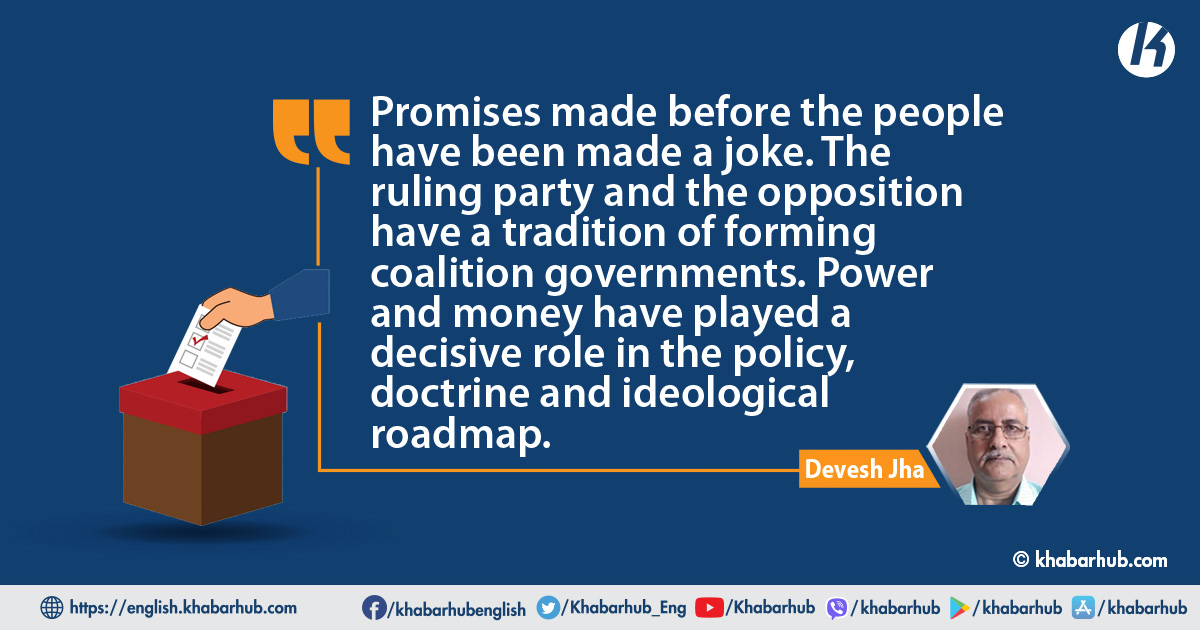With the end of the speculation over whether the election will be held or not, the registration process for the local bodies has been completed and the formal competition has started.
Despite all the accusations, sarcasm and jokes, an alliance has been formed between almost all the major political parties.
As initially claimed, the ruling party and the opposition could not form two separate coalitions. Except for a few metropolitan and sub-metropolitan areas, leadership’s appeal does not seem to be abided by.
If the information received during the registration process for the election is to be considered, alliances have been formed among the parties including Nepali Congress, UML, Maoist Center, Janata Samajwadi Party and Rastriya Prajatantra Party.
Interestingly, in Damak, Jhapa, there is a scene of the ruling coalition, including the Maoists forming an alliance supporting the royalist RPP.
The performance of those who left the party dissatisfied with the alliance has also been quite interesting as instances show how aspirants have joined another party deserting their own.
Even the major parties, which have been laying down the principle of long-term commitment along with principles and philosophy, did not hesitate to nominate a newcomer.
Until the two-day registration process was completed, it was not possible to ascertain which party would be the candidate from which constituencies.
Looking at the details so far, it seems that there is a long line of rebel and independent candidates. Due to this, the manifesto issued by the party at the national level has become irrelevant and meaningless exposing the weak management of the party concerned.
The very sensitive and dignified idea of ’consensus and cooperation’, which was introduced into politics after the Second People’s Movement, now seems to have been turned into a farce.
Coalition government and coalition politics seem to be almost everywhere in the contemporary world.
In Asia, almost all the countries including China, India, Bangladesh, Pakistan, Sri Lanka, Philippines, Indonesia, Japan and Nepal seem to have accepted partial or complete alliance politics.
Despite the one-party communist regime in China, the United Front coalition government is led by the Chinese Communist Party.
In Indian politics, the Bharatiya Janata Party was formed in 1977 to protest against the emergency imposed by the then Prime Minister, the late Indira Gandhi.
Later, two major alliances were formed, the United Progressive Alliance led by the Congress and the National Democratic Alliance led by the Bharatiya Janata Party.
The coalition culture has entered Nepal’s politics since 2007 BS. The first government formed after the end of the Rana regime was led by a Rana Prime Minister in which the then leader of the then rebel party — Nepali Congress — had joined the government.
Recently, after the restoration of multi-party democracy, a coalition government was formed between RPP-UML and RPP-Congress. At present, a five-party coalition government led by the Nepali Congress has been formed and is functioning.
In the parliamentary election, the then UML and the Maoist forged an alliance and later formed the Nepal Communist Party by uniting the two parties.
The party was divided as it could not reconcile its differences and maintain its internal balance. The UML is in the opposition while the other two parties — Maoist Center and the Unified Socialist — have become allies.
Currently, these leftist parties (which were once together) continue to express sarcasm with extremely harsh statements and accusations against one another.
Despite this, according to the political environment at the local level, an interesting alliance has been formed as per the expectation of immediate benefit by abandoning the policy, principles and ideological basis.
On the one hand, it has tried to justify itself only through the manifesto, while the party which has been found wrong in the same manifesto has been made a co-passenger.
In other words, it is not clear what message the political parties are trying to convey to the people.
Meanwhile, reports suggest that such unique coordination is now gradually moving towards forming a roadmap, which seems to advance two types of scenarios or possibilities.
Accordingly, a candidate who is not satisfied with the campaigning to win the election may adopt a personal campaign strategy considering the self-formed coalition as cumbersome.
In this process, a situation may be created in which anyone who helps himself to win and does not vote for the candidate of his party, which ultimately will destabilize party politics, and weaken or end the leadership control over the party.
Second, polarization towards official candidates may increase if party cadres develop emotional attitudes towards their party.
Nepal’s politics now seems to have reached its most complex stage. The flow of services is being hampered as the important, sensitive and theoretically decisive place of the state has been made a means of buying and selling.
This situation should be described as favorable for party management. However, the outcome may not be so immense because the cadres who are irritated by the leadership’s heinous behavior, family, and financial dealings do not seem to have respect for their own leader.
The very sensitive and dignified idea of ’consensus and cooperation’, which was introduced into politics after the Second People’s Movement, now seems to have been turned into a farce.
Promises made before the people have been made a joke. The government and the opposition have a tradition of forming a coalition government.
Power and money have played a decisive role in the policy, doctrine and ideological roadmap. Politics is considered an industry instead of a service.
Nepal’s politics now seems to have reached its most complex stage. The flow of services is being hampered as the important, sensitive and theoretically decisive place of the state has been made a means of buying and selling.
If a candidate succeeds in winning the local body elections through personal influence, then the instruction of the party leadership is likely to be ignored.
In contemporary national politics, everyone has the opportunity to understand their own status.
The results of this election seem to be a guide to identifying the unnecessary masses, ending the politics of prohibition, and broadening the scope of consensus and cooperation.
Therefore, the politics of the alliance will yield results if it can seize the opportunity, otherwise, the country would undergo a chaotic situation.









Comment